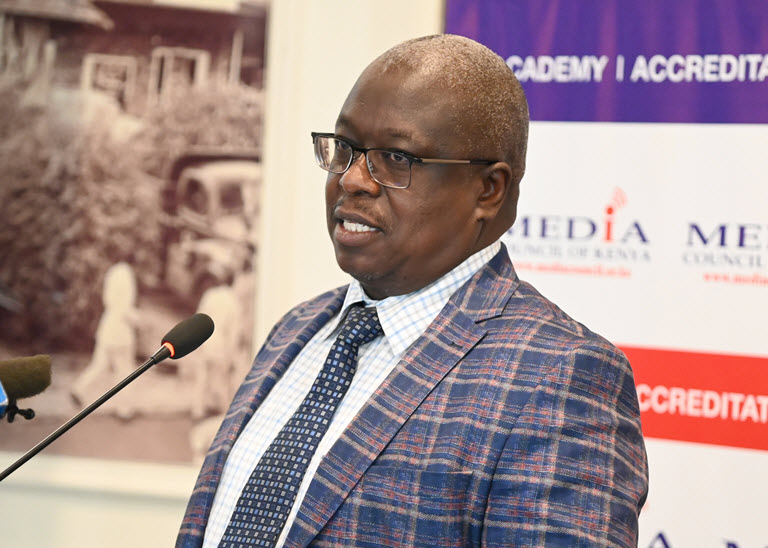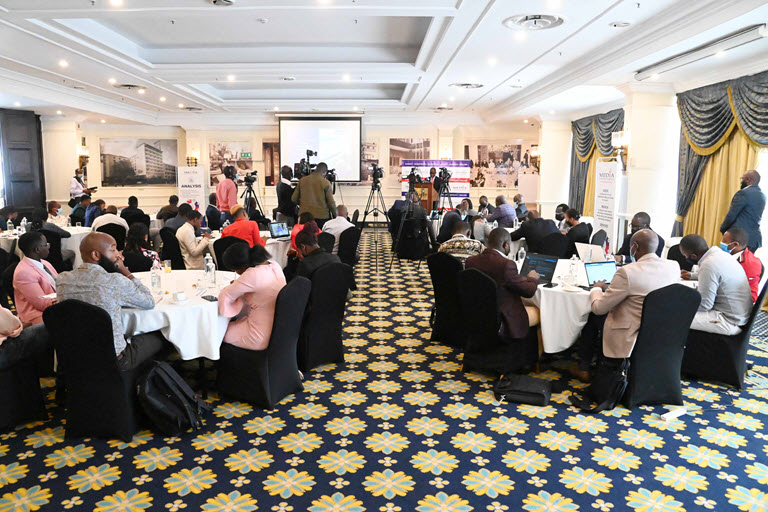For the second year running, a survey commissioned by the Media Council of Kenya shows that the trust level in Kenyan media has nosedived, raising fundamental questions on how media will play its watchdog role more so with landmark elections set for August 9. EAST Site writer Isaac Swila explores.
Media stakeholders in Kenya are scratching their heads after a 2021 survey by the Media Council of Kenya (MCK) showed that the trust level in media has dropped by a massive 12 percent.
The findings released in January 2022 emanate from a survey conducted last December, which sampled some 3,589 respondents across Kenya’s 47 counties.
Equally perplexing is that the trust level is steadily declining compared to the previous research conducted by the same organisation.
For instance, in its 2019 findings, MCK’s survey concluded that 48 percent of Kenyans had a lot of trust in media. However, in 2020 the trust level dropped to 35 percent. Whereas the 2021 survey shows that 23 percent of Kenyans had a lot of trust in media, compared to the 2019 findings, alarm bells should ring as Kenyans’ trust in the press had lost 25 percent.
Worrying trend
Broken down, 24 percent of the respondents said they had little or no trust in the media. In comparison, 53 percent of the respondents had some confidence in the press, showing general scepticism towards the media institution.
The overall trust rating on all media platforms averaged 63 percent. Television had the highest rating at 69 percent, followed by radio at 68 percent. Online news websites had the lowest rating at 56 percent.

Equally, 12 percent of the respondents expressed having concerns with media, while 88 percent did not. The concerns ranged from the lack of inclusivity in reporting, such as using the English language in TV content, which limits consumption, thereby excluding voices of people from rural areas during national discussions.
“Some are saying there is a lot of content with too much English, “Leo Mutisya, the project’s lead researcher, said during a recent discussion of the MCK survey at the Aga Khan University. “There are others who are worried about the foreign content in the media, so we really can’t say what it is, but it’s (trust level) dropping, and we are monitoring to see what we can make out of it,” Mutisya added.
In addition, the survey found out that, in some instances, the media encouraged vices such as gambling (which came in the form of advertisements).
Spotlight on the media ahead of August polls
The survey findings are seen as a slap on the face to the media which six years ago had been picked by several pollsters as the most trusted institution in Kenya. The dwindling trust in media would most likely trigger debates ahead of the August 9 general elections.
Through its watchdog role, the media is highly relied upon as a tool of information and puts the government in check by advancing accountability. “We don’t know what it is (causing the drop in trust level). We don’t know if it’s COVID. So we are trying to determine whether it’s COVID or the kind of content that the media is airing today,” Mutisya said. MCK conducted the survey during a political campaign period.
Is politics to blame?
“You know we have the Hustler and the Azimio pitting against each other, and Kenyans are getting confused,” Mutisya said of the two major competing political camps ahead of the August polls.
“There is also the issue of the media focusing too much on politics,” he noted, adding that consumers’ feedback points to “too much politics.”
For Joshua Obuya, one of the researchers, two things count. “In terms of comparing the populations and respondents in both the services. One equation I would ask is where they are similar in terms of the demographics and perceptions and the point in time. That is what I would want to know,” Obuya said.
A need to dig deeper
According to Mutisya, the study was not a market survey, but it aimed to collect opinions from across the country on the state of the media as required by law. He, however, agrees that there is a need to go beyond that and dig deeper. Mutisya also stressed a need for more partnerships on the part of MCK.
“A survey of this nature costs millions of money, and we’re always competing with lots of interest within the commission(MCK). So maybe, in the future, we need to identify the base of support in terms of finances and resources,” he noted.
Meanwhile, media scholar Dr Nancy Booker pointed out the need to do further research as “there are things that need exploration”.

But why were the findings not in-depth and failed to give specific reasons for the media trust deficit?
“I would take these figures with a pinch of salt because there are questions about their methods,” former Nation Media Group editorial director and a veteran media trainer and practitioner Joe Odindo said.
“It is a perception thing, and there are a lot of questions. Even if you talk about trust, who did you ask about trust, how do they interact with media, and what do they consume in media?” Odindo posed.
Information overload
“However, anecdotally, the media has been greatly affected by the saturation of information since that space has been democratised, and many people don’t know what to believe and what not to believe,” he added.
According to Odindo, who also served as Standard Media Group editorial director, there is a greater need for media that can guarantee quality, credible and valuable information.
“Right now, we know from the American experience during the Trump era that people have actually turned more to CNN and New York Times to get credible information. Even consumption went higher, and subscriptions too. So now, people do not pay for things they don’t trust or dislike. The pattern changed.”
Odindo believes that the saturation of media and the democratisation of the media space has highlighted the real value of journalism, quality information, and content that audiences can trust.
 Isaac Swila
Isaac SwilaReport by Aga Khan University’s Media Innovation Centre analyses the country’s millennials and digital natives’ media consumption habits.
For the media to flourish, and the society to have free flow of accurate and verifiable information, journalists, the drivers in the passing of information are expected to be well grounded in laws and the legal aspect pertaining to the job, writes Alfred Ganzo.
Pitching provides numerous opportunities for your new or existing business ideas to be discovered and realized; and as Simon Mtabazi writes, some startups have become billion-dollar companies due to efffevie pitches
The success you achieve with your media startup business will heavily rely on your reputation as a trustworthy company, and as Nandi Mwiyombella writes, it will also open a new window for customers and potential investors.
That’s why I think today is such a great space for us to sit back and reflect on the questions that could help us shape the kind of journalism that we want to see in our local and global community.
The report specifically analysed eight major variables which include: newsroom structure and resources, media ownership and business models, organisational capacity, innovation culture, journalism culture, financial trends and results, content quality and COVID-19.
Mudi, in her role as Media Council of Kenya regional coordinator in charge of Mombasa(covering the entire coastal region), has found herself at the forefront in advocating and fighting to protect journalists’ rights, culminating in her being awarded for her peace efforts in the run-up and during the 2022 general elections in Kenya.
The 2022 general elections have been mentally draining for journalists, some of whom have had to stay on the campaign trail for over a year. Others have had to toy with the tough call of managing teams in the newsroom. East Site’s Isaac Swila and political writer Rawlings Otieno recount their experiences
What role did social media influencers play in the election? What voice did they give in political discourses during and around the election period? And to what extent did political candidates involve the influencers in marketing their manifestos to sway votes in their favour? East Site writer Steven Omondi unpacks the details
The media industry is experiencing enormous transformation as new digital trends emerge. With the vast opportunities that the digital space offers, media owners and content producers must deliberately adapt to how the audience consumes content.
With the increased Digital Technology at the palm of just anybody; there are a lot of information that distort whether deliberately or not highlighting the need of robust Fact0checking as Asha D. Abinallah explains
Is there a danger in media personalities having a vibrant social media presence? Assuming they have a massive media following, should they self-regulate and filter what they post? And when they engage with followers, should their opinions be taken as personal, or does it represent the journalist’s media house? East Site writer Isaac Swila explores
Media stakeholders are raising concerns over the lack of gender-inclusive reporting in East African newsrooms. They want concerted efforts to ensure more female journalists get equal opportunities like their male counterparts.
The partnership will also ensure that local content is curated and distributed to better optimize the product and meet the needs of Kenyan online users.
The news industry is constantly changing, and in the last few years, User Generated Content (UGC) has become a ubiquitous feature in news sourcing and packaging. However, media houses and journalists need to establish verification and credibility safeguards to avoid the misinformation trap.
Reporting on elections is, for many journalists, an opportunity to establish themselves as reliable political reporters. But the task comes with certain risks, particularly in the East African sub-region.
Stakeholders are now calling for concerted efforts, better planning and preparations for journalists before they are sent out on the field to cover Kenya’s high-stakes August 9 General Elections.
East Africa’s media grapples with a myriad of challenges whenever general elections approach. Not only do editors struggle with balancing the competing political interests, at times at the altar of professionalism, but individual journalists pay dearly, many suffering attacks in the course of their duties.
As Form One students settle into a new life in secondary school, this has also been a period of reflection. We have read tear-jerking and heart-warming stories of determined students who overcame many odds to get an education and how well-wishers came together in their aid.
There is renewed optimism in the Tanzanian media space following the ascension to power of President Samia Suluhu whose regime is keen to relax some of the laws deemed punitive to journalists and media houses
Uganda fell behind, whereas Kenya improved its press freedom ranking in the Reporters Without Borders 2022 Press Freedom Index. And after years of media freedom decline, Tanzania appears to be on the right track. But overall, media freedom activists say there is still work to be done.
A free and independent press is the cornerstone of any democracy and the foundation of economic success, mostly because through our free press, we’re able to hold the leadership to account.
To align with the changing times and stay relevant in the business, media houses are challenged to rethink their strategy and to adopt and understand obstacles and challenges they face towards rethinking and exploring alternative sources of revenue and on developing the digital strategy.
A team of young, Tanzanian tech-savvy communication professionals is dreaming big. It seeks to usher a new dawn in media business management in Tanzania by optimising employee output and offering consultancy to media businesses on how they can operate with a minimal budget but still attain their goals.
Bloggers and influencers have become an integral component of information sourcing across East Africa. The public uses blogs, privately run websites and social networks to crowdsource information from social networks, which they then publish and distribute. But it’s not all rosy for this group of content makers.
The chances of meeting a medical graduate practising journalism are usually very slim, especially in Sub-Saharan Africa. But two Tanzanian physicians have broken away from that norm by inventing a start-up called Afyatoon. It uses visual art technology to tell compelling medical stories. They narrate to the EAST Site their experience and share their vision for the future.
Did you know that in 2021 Kenyans watched less TV and spent more time on social media? Or that some Kenyans rely on family, friends, or even social media icons and bloggers as a source of news and information? These are some of the conclusions highlighted in the 2021 State of the Media Survey conducted by the Media Council of Kenya (MCK).
The effects of the Covid pandemic continue to change the world in ways we had not imagined possible. The media is going through a painful transformation to keep up with changing production, distribution and consumption habits. In East Africa, Uganda’s Media Challenge Initiative (MCI) recently hosted a panel discussion on Media Viability comprising experienced journalists from Television, Radio, Print and Online/Digital media to address lessons learned from the pandemic. East Site’s Moses Mutente attended the panel and compiled this article.
In this commentary, Uganda-based journalist Caleb Okereke shares deep personal insights into why media schools in East Africa must rethink their curriculum. He stresses the need for trainers to begin teaching media ownership to better equip journalism students for the dynamic and cutthroat job market by taking us through his journey as a journalism student and media owner.
Legacy media is currently caught between a rock and a hard place — the Covid pandemic and the rise and proliferation of social media has hit revenues hard. Some say this could signal the end of news as we used to know it. However, Ugandan decorated journalist Ernest Bazanye believes the industry will survive and thrive, but not without a fight.